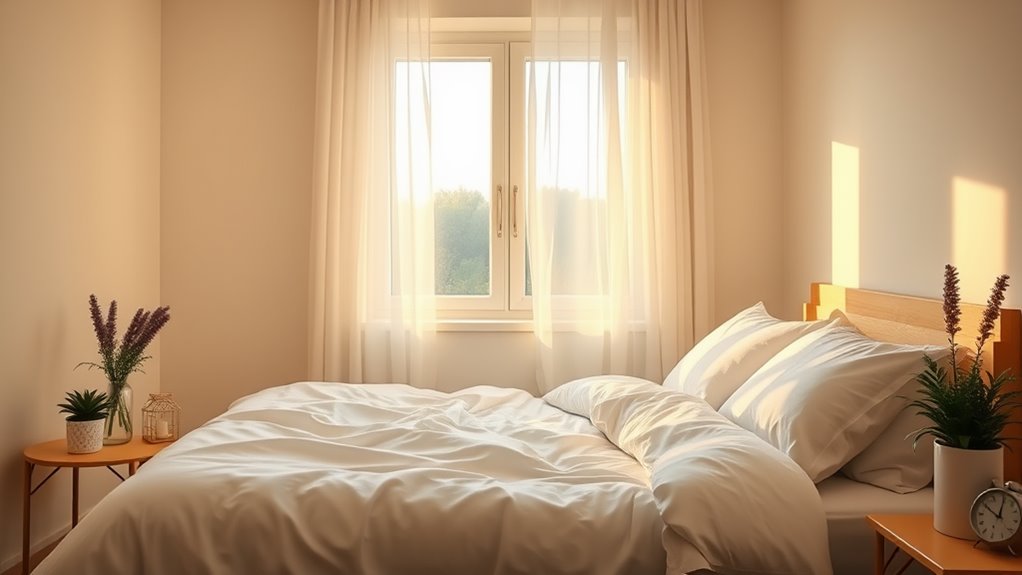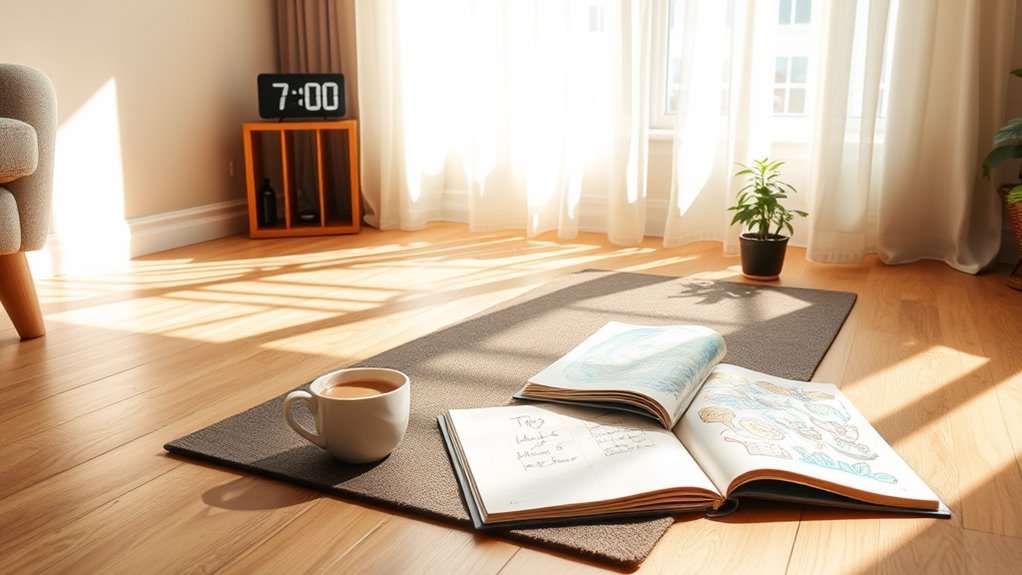How I Improved My Sleep by Making These Simple Changes
You can improve your sleep by making a few simple changes. Start by establishing a consistent sleep schedule, going to bed and waking up at the same time daily. Enhance your sleep environment by keeping the room dark, quiet, and cool. Implement relaxation techniques like deep breathing or mindfulness before bed. Limit screen time by creating a digital curfew and track your progress to find what works best for you. Discover even more effective strategies ahead!
Key Takeaways
- I established a consistent sleep schedule by going to bed and waking up at the same time every day, even on weekends.
- I enhanced my sleep environment with blackout curtains, comfortable bedding, and a cool temperature to promote better rest.
- I implemented relaxation techniques like mindfulness meditation and deep breathing exercises to unwind before bedtime.
- I managed my electronic device usage by turning them off an hour before sleep to reduce blue light exposure.
- I tracked my sleep patterns with a sleep diary, allowing me to adjust my habits for improved sleep quality.
Establishing a Consistent Sleep Schedule
When you establish a consistent sleep schedule, you’re not just setting a routine; you’re actively supporting your overall health and well-being.
By aligning your sleep patterns with your body’s natural rhythms, you’re paving the way for better sleep. Consistency enhances cognitive function, stabilizes your mood, and reduces anxiety, creating a solid foundation for mental clarity. Additionally, better sleep consistency improves overall health, reducing the risk of sleep disorders and insomnia, which can further enhance your quality of life. Studies show that achieving restful nights can lead to improved emotional resilience and better daily performance.
Moreover, regular sleep timing boosts your immune system and regulates appetite hormones, aiding in weight management and overall physical health.
You’ll find that sticking to a schedule not only improves sleep quality but also lowers the risk of serious health issues, like cardiovascular diseases.
Ultimately, a consistent sleep schedule is key to revealing ideal health and longevity.
Enhancing Sleep Environment
To enhance your sleep environment, start by controlling the light in your bedroom. Dimming lights and using blackout curtains can help create a dark, calming space that promotes better sleep. Additionally, regulating the temperature to a comfortable range will further support your restfulness and relaxation. Maintaining a consistent sleep schedule is also crucial as it signals to your body when it’s time to sleep. Incorporating a simple nighttime routine can further improve your sleep quality and help you unwind before bed.
Light Control Strategies
Creating a sleep-friendly environment hinges on light control, as maintaining darkness in your bedroom is essential for quality rest. Consider implementing these strategies to optimize your sleep space:
| Strategy | Description |
|---|---|
| Blackout Curtains/Blinds | Block external light sources effectively. |
| Sleep Masks | Use if you can’t darken your room completely. |
| Dim Red Nightlights | Provide minimal light without disrupting sleep. |
| Blue Light Restriction | Reduce screen time before bed to maintain melatonin. |
Additionally, it’s important to recognize that light strongly affects circadian rhythms, influencing your overall sleep quality. Implementing these light control strategies can significantly transform your sleep by creating an optimal environment conducive to rest.
Temperature Regulation Tips
Maintaining the right temperature in your bedroom can greatly enhance your sleep quality. Aim for a range between 65°F and 68°F, as this supports your body’s natural circadian rhythm. Optimal room temperature for sleep is approximately 19-21°C, which aligns closely with the Fahrenheit range mentioned. Warming your skin slightly before bed can shorten sleep latency, making it easier to drift off. Consider a warm bath to initiate vasodilation, allowing your core temperature to drop effectively. Additionally, establishing a relaxing bedtime routine can further promote better sleep quality. Create a cozy bed microclimate with bedding that retains warmth while maintaining humidity between 40% and 60%. Adjust covers and positions as needed to prevent discomfort from cold or heat. Consistency in your sleep environment helps your body recognize and adapt, leading to deeper, more restorative sleep. Prioritize temperature management for long-term health benefits.
Implementing Relaxation Techniques
While you might feel overwhelmed by the demands of daily life, implementing relaxation techniques can greatly enhance your sleep quality.
Start by incorporating mindfulness meditation or deep breathing exercises, like the 4-7-8 method, to calm your mind and slow your heart rate. A simple yet effective technique to consider is a soothing breathing exercise, which can enhance your sleep quality and promote relaxation before bedtime.
Progressive Muscle Relaxation (PMR) can help release physical tension, while guided imagery allows you to visualize serene landscapes, distracting you from stress.
Establish a consistent pre-bed routine to make these practices effective.
Experiment with yoga or hypnosis to find what resonates best with you.
Remember, creating a comfortable environment and utilizing apps for guided sessions can further support your efforts.
Engaging in Daytime Activities
To improve your sleep, it’s essential to engage in regular exercise and limit stimulant intake throughout the day.
Physical activity boosts sleep quality by reducing disturbances and daytime fatigue, while cutting back on caffeine helps your body wind down.
Exercise Regularly
Engaging in regular exercise not only boosts your physical health but also greatly enhances your sleep quality.
When you commit to a consistent workout routine, you’ll experience significant improvements in your sleep patterns.
Here are three key benefits of regular exercise for better sleep:
-
Improved Sleep Efficiency****: Physical activity helps you fall asleep faster and stay asleep longer, maximizing your restful hours.
-
Reduced Stress Levels: Exercise lowers cortisol levels, minimizing anxiety and creating a calmer state conducive to sleep.
-
Enhanced Circadian Rhythm: Daytime workouts stabilize your sleep-wake cycle, making it easier for you to drift off at night.
Limit Stimulants Intake
Limiting stimulant intake is essential for achieving better sleep, and one effective way to do this is by staying active during the day. Engaging in outdoor activities not only exposes you to sunlight, helping regulate your circadian rhythms, but also keeps your energy levels balanced.
Mental stimulation through hobbies or social interactions reduces reliance on stimulants like caffeine or nicotine, which can disrupt your sleep-wake cycle. By maintaining a structured work routine and participating in sports or leisure activities, you create a productive environment that fosters alertness without the need for stimulants.
Prioritize daytime engagement to cultivate a natural rhythm, allowing your body to unwind in the evening and prepare for restorative sleep.
Managing Electronic Devices
Managing electronic devices effectively is essential for a good night’s sleep. The blue light emitted by these devices can greatly disrupt your melatonin production, making it harder to fall asleep.
To enhance your sleep quality, consider these strategies:
-
Establish a Digital Curfew****: Turn off all devices at least an hour before bedtime to help your body wind down.
-
Create a Device-Free Bedroom****: Keep electronic devices out of your bedroom to associate your sleeping space solely with rest.
-
Use Blue Light Filters: Enable night modes on devices or wear blue light filtering glasses to minimize melatonin suppression.
Fostering Healthy Habits
After addressing the impact of electronic devices on your sleep, it’s time to explore how fostering healthy habits can further enhance your rest.
Start by incorporating regular physical activity into your routine; morning workouts can boost your circadian rhythm and improve sleep quality. Aim for higher-intensity exercises, but avoid late-night sessions to prevent melatonin disruption.
Next, focus on your diet—consume fiber-rich foods, fruits, and proteins like poultry and fish to aid melatonin production. Limit heavy meals, caffeine, and alcohol in the evening.
Finally, establish a consistent sleep schedule by going to bed and waking up at the same time daily, even on weekends. These habits will create a foundation for deeper, restorative sleep.
Tracking Progress and Adjusting Strategies
How can you effectively track your sleep and make meaningful adjustments? Start by leveraging technology and data to refine your sleep strategies. Here are three powerful methods to enhance your tracking:
-
Wearable Devices: Use gadgets like WHOOP or Fitbit to monitor sleep stages and heart rate.
-
Mobile Apps: Employ apps such as Rise Science to analyze sleep debt and align your circadian rhythms.
-
Sleep Diaries: Keep a journal to record patterns and habits manually, providing insights that devices might miss.
Once you gather data, interpret it wisely. Adjust sleep schedules based on sleep debt, modify environmental factors for comfort, and fine-tune routines to align with your natural rhythms.
Mastering your sleep is an ongoing process, so stay adaptable.
Frequently Asked Questions
How Long Does It Take to See Sleep Improvement?
You can typically notice improvements in your sleep quality within a few weeks of adopting consistent habits. Stay persistent, track your progress, and make adjustments as needed to enhance your nighttime rest effectively.
What if I Wake up Frequently at Night?
Waking up at night can feel like a ship tossed by waves. You can conquer frequent awakenings by addressing stress, optimizing your sleep environment, and establishing a consistent routine. Master those changes, and reclaim your restful nights.
Can Sleep Supplements Help Improve My Sleep?
Yes, sleep supplements like melatonin and magnesium can enhance your sleep quality. However, results vary, so it’s essential to consult with a healthcare provider and combine them with healthy sleep habits for best results.
Is It Normal to Have Trouble Sleeping Sometimes?
It’s completely normal to have trouble sleeping sometimes. Life’s stresses, changes in routine, or even diet can disrupt your sleep. Recognizing it’s common helps you approach solutions with confidence and resilience. You’re not alone.
How Can I Help a Partner Who Snores?
You might consider gently encouraging your partner to explore positional therapy or anti-snoring pillows. Together, you can create a peaceful sleeping environment while promoting healthier habits like reducing alcohol intake and ensuring proper head alignment during sleep.
References
- https://www.sleepfoundation.org/sleep-hygiene
- https://elearning.shisu.edu.cn/pluginfile.php/35310/mod_resource/content/2/Research-Intro-Flick.pdf
- https://pmc.ncbi.nlm.nih.gov/articles/PMC8196727/
- https://www.cag.edu.tr/uploads/site/lecturer-files/387-2-english-vocabulary-in-use-pre-intermediate-and-intermediate-redman-2017-4th-264p-sayfalar-silindi-3br9.pdf
- https://www.mdanderson.org/publications/focused-on-health/healthy-sleep-habits.h13-1589046.html
- https://www.sleep.com/sleep-health/sleep-schedule
- https://hr.wustl.edu/creating-a-sleep-routine-6-steps-to-better-sleep/
- https://www.news-medical.net/news/20241201/Heart-health-benefits-soar-with-regular-sleep-schedules-research-finds.aspx
- https://www.sleepfoundation.org/how-sleep-works/benefits-of-sleep
- https://mindease.io/wellness-blog/consistent-sleep-schedule-benefits-fix-circadian-rhythm





